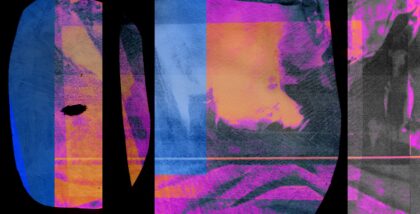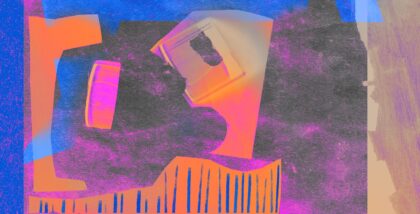 Artwork by Candice Evers
Artwork by Candice Evers
CHANDRA ENTERS
Uncle was a soldier who trained soldiers. Auntie was a weaver who tamed Nāgas. Nāgas are finicky things to stretch on a loom. They are serpent demi-gods, and demi-gods are known to be inflexible. The trick, Auntie revealed to us once, was to think of Nāgas as eels. Then, you would no longer be cowed by their fearsome moods or be worried about what misfortunes lay in their wake. If you could see that Nāgas, like their brother-eels, were moved by the ebbs and flows of nature and not by the rule of men, then you could learn to live with them.
But then Uncle killed Auntie, and now Auntie is gone.
THE MONKS CHANT
Fathers, sons, brothers, husbands. Buat for your dead, so that they may win merit. Merit in this life will bring merit in the other. Good deeds bring good fortune, good karma builds good credit – a high-rated score for your immortal soul. Come pray with us for a moment, stay with us on the Great Ferris Wheel.
CHANDRA IN THE LIVING ROOM PART 1
Uncle killed Auntie last week. That is how the thread of her life was cut.
When the police asked Uncle why he had killed Auntie, Uncle said that no one could escape their fate, not even Auntie who knew how to tame Nāgas. The officers put a suicide-prevention vest on him, handed his mugshot to the press, and locked him inside a psychiatric prison. Sometimes, a doctor would ask Uncle for a motive, but Uncle would always answer the same way, that it was fate.
At Auntie’s house in North Carolina, we gathered, and we wept. People drove from Florida, people drove from Ontario. I flew in from Maine. I was in the mountains when Malee called me in tears.
Now funeral rites needed to be observed. Souls needed to be released. On a small table in Auntie’s living room, we laid offerings of fruit and flowers on a vermeil tray, and long sticks of incense on her embroidered tablecloth. The house smelled of orange blossom water.
“They said we can’t buat,” whispered Malee.
Malee and I had been sitting on the floor all morning, legs tucked in sideways, to watch the guests arrive – old men who dropped French words here and there, ruins of a colonial upbringing. Old women whose hair remained black despite their advanced age. They all wanted to know why Uncle had committed such a horrible crime, but no one could answer that question. We watched them as they watched us, their morbid curiosity pressed bare against our muted grief. In the dull thrall of their scrutiny, I did not hear what my elder sister said, so she said it again.
“The monks won’t allow our family to buat.”
It sounded improbable, at first, that buat could not be performed for Auntie, who had been the embodiment of kindness itself. Buat was the transmogrification of good deeds into good luck, a way for our family to say: “May these be added to the merit you have already earned, until the day we meet again.” It was accomplished when the male relatives of the deceased entered the monkhood, temporarily or forever, and stayed at a temple to devote themselves to contemplation.
It was an act of love as much as it was a spiritual transaction, a rite of passage that Malee and I had witnessed often, having seen our friends and acquaintances shave their heads and eyebrows in preparation. My belief in it was flimsy, perhaps – a ritual reserved only for men could not possibly hold the truth of the universe – but my feminist proclivities did not rob the ritual of its importance to our family, of the extraordinary tenderness it beheld.
“Dad was going to buat?” I said.
“He’s angry that he can’t,” replied Malee.
“And mom?”
“She was crying in Auntie’s bedroom earlier.”
My parents had not spoken to me since I landed. To them, I was an ingrate child who never called and never sent money. Even Malee thought I was impossible sometimes, that I went out of my way to be difficult. They did not understand how deeply I loved them, how fiercely I could wage war in their name. But this was also my fault. I had avoided coming home for a long time.
THE MONKS CHANT
Mothers, daughters, sisters, wives. The Path ahead of you is long, so make sure you pack light. Leave behind all doubts you may have, all fears that may arise. Learn the biology of selflessness, which is to say, your bodies are not real.
CHANDRA IN THE LIVING ROOM PART 2
Our legs ached. It had been many years since Malee and I were required to sit this way, the tuck-your-legs-under-your-buttocks-like-you’re-at-temple way. The protruding bones of our ankles kept hitting the floor as we tried to adjust our position. All the chairs were occupied by our elders. Although it hurt to sit like this, I relished it; Malee and I had not enjoyed such closeness since I had left home. We repositioned our aching legs again but did not attempt to get up.
More people entered the house, their shoulders dampened by the rain. In the kitchen, our cousins were preparing dinner in anticipation of the monks’ arrival. In the living room, a plastic bag full of ceremonial sashes was being passed around. I retrieved a blue one from it. Over the years, Auntie had sewn enough sashes to dress an entire village, crisscrossing stitches of gold and bronze through panes of colorful silks. As the guests began taking their places around Malee and I, the absence of shaved heads needled me with anguish.
“When will the monks get here?” I asked.
“In an hour, I think,” she replied, adjusting my sash.
“We’re really not going to buat?”
With a sigh, Malee repeated what the monks had already told Dad – that a violent death was the consequence of having committed a great sin in a former life. I could see that my sister resented the implication as much as I did, this notion that Auntie’s brutal death was the result of some metaphysical wrong no one could remember. But unlike me, Malee always made attempts to plait our beliefs together, no matter how contradictory they could be.
“Maybe it’s not that she deserved to die,” said Malee. “Maybe it’s like a scale that needs to be evened out.”
“It doesn’t feel even.”
“Uncle will be punished next lifetime. That sounds even.”
I didn’t dare ask her if she thought Uncle would still deserve his punishment if he were reborn a saint. I didn’t dare ask her if the family he’d have in that new existence would also deserve to lose him to a painful death. I did not ask Malee those questions because I was afraid to say, Dad used to hit me until I couldn’t stand anymore. Tell me why I deserved it.
“Who decides when things are even,” I said more sharply than I intended.
“It’s not up to us to decide,” replied Malee.
“I’ll do the buat myself.”
“It won’t count, Chandra. The monks said no, and also, you’re not a man.”
“I’m not going to do it on their terms.”
“Then what’s the point of doing it at all?”
Perhaps I could have told her that the inflexible can be bent if you break it into enough pieces, but I did not want her to learn how much it cost to do the breaking. It was the third and last day of the funeral rites. The monks would be here soon to chant the last prayers. They would tie a long white piece of yarn around the living room and tell Auntie’s ghost that it was time to leave.
THE MONKS CHANT
The string of Fate ties the world together and must remain unbroken. Bind your wrists in prayer but unspool yourself from the desire of wanting too much. Instead, become transcendent, limpid and transparent. Love too will pass.
CHANDRA IN THE SEWING ROOM
There are many families like ours, who rethread the same lines simply because well-worn lines are the easiest to follow. Every man in our family eventually joins the army, and every woman in our family has a sewing room. At some point in our history, habits became sanctified into traditions.
There is a sewing room in Auntie’s house too, though she had swapped her machine for a loom. I went there to look for shears and clippers, knowing with certainty that I would find them here. We were a clan of soldiers and seamstresses, after all. While Malee was busy downstairs, I carefully cut my hair, then shaved my head and my eyebrows.
Above me, Auntie’s tapestries hung in a riot of lines and colors – meandrous designs she had plucked from the ether. When a pattern didn’t work out the way she had hoped, she would unravel it, and take it in a different direction. The resulting piece often turned out askew – loose in some parts, too tight in others – but the Nāga symbol was always there, looking like a flattened S or a curly W, woven without a thought for balance or symmetry. Nāgas, the sacred creatures of our people, the water protectors, the makers of rain but also the bringers of floods and catastrophes – became little eels once Auntie was through with them. Instead of lining up in orderly rows, they looked like random squiggles in the middle of flowers and zigzags in the middle of mountains. Little eels caught in the warp of her mischief.
THE MONKS CHANT
Give food to those who are hungry but do not feed the hungry ghosts. No meal will sate them, no buffets will suffice. Once you learn to want, you can only want more. Forgo the snacks, forgo the picnics and learn to swallow the Light.
CHANDRA IN THE KITCHEN
Malee saw me first. I had come downstairs from the sewing room and had gone directly to the kitchen. But the kitchen was only separated from the living room by an island, and soon everyone who had been sitting down on the other side turned to look at me in shock. And then the front door opened, and the newly arrived monks made their way towards us, shuffling in their Birkenstocks and thick saffron robes.
My arm was jerked backwards, hard. I turned around to behold Mom’s furious expression, her face so red it looked as if she would start bleeding from the mouth. Her nails dug deep into my wrist, a sensation I remembered from my childhood, but I did not feel it. The scratching and clawing of everyone’s eyes felt more agonizing to me than that physical pain. One of my cousins suddenly broke into a sob, and the anguished cry tore into my resolve like shrapnel.
“What are you doing?” asked the head monk.
“Forgive her, Ajahn,” said Mom, bowing her head as low as she could.
“I am doing a buat,” I replied.
The younger monks visibly repressed their laughter. It was not a mean laugh, not even a snicker. It was the kind of laugh you had for a child who was wearing her parents’ bathrobe, pretending it was anything but a bathrobe. I understood that my self-ordination would not be real to them, not official in any religious sort of way, but I was not doing it for the scriptures. I wanted to do it for Auntie. Because if Auntie’s spirit was still here right now, if she could see any of this, then I wanted her to know that it was not her fault Uncle killed her.
Not her fault.
A man killed her, and then other men decreed it was her bad karma.
“It’s a buat for Auntie,” I said again, a lot louder.
The head monk shook his head and continued towards the chair that had been assigned to him, followed by his novices. Everyone was still staring at me, whispering harshly among themselves. They only stopped when the chanting began, as if I had never existed. On the wall behind the monks, Auntie’s last tapestry had been mounted, its frayed edge betraying its unfinished state.
THE MONKS CHANT
Men and women without wisdom are condemned to be reborn a hundred more times as women, and a hundred more – until your mistakes are corrected and your bad seeds uprooted. Only then will you be allowed to leave the loop of karma.
CHANDRA IN THE GARDEN
The house was empty when I woke up. Everyone had gone to the funeral home for the incineration. Holding each other by the elbow, they would watch Auntie’s coffin roll towards the flames as reality broke over them like a scalding wave. They would never see Auntie again. Never, ever again. Auntie is gone. Mom will cry for years to come. I knew this, because Auntie was her eldest sister, and if I lost Malee, I would cry for years, too. But I didn’t know how to console my mother, nor my father.
I grabbed the offerings from the living room and headed to the garden. I dug the soil with my hands, and buried the incense, the flowers, and the fruit under the marigolds. I don’t know why – it was feral, like a wild animal burying its sustenance for the long winter ahead. But deep in my marrow-memory, long before the shuffle of saffron robes was glimpsed in the countryside, I knew that my ancestors lived in the forest. They would have looked for their future through sunlit canopies full of rapturous birds. They would have washed their long hair in the rivers and chosen to let demi-gods swim through their fingers like slippery eels.





















